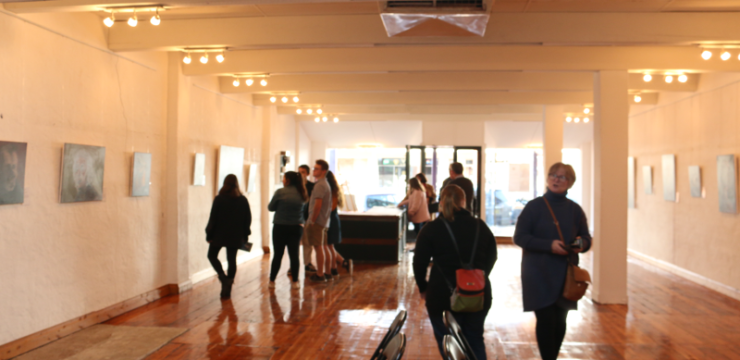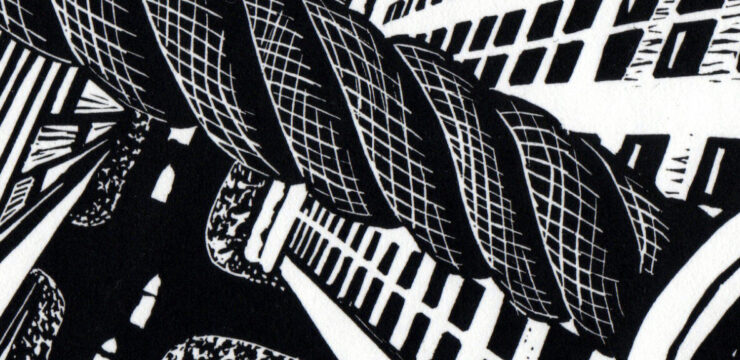Finding her voice
 Scene from Son of Satan's Wife the Fourth. Photo credit: Mitch Lee
Scene from Son of Satan's Wife the Fourth. Photo credit: Mitch Lee“I have an NDIS plan and I have a mental illness (Dissociative Identity Disorder) and a psychosocial disability,” says Erika. “My interactions with the ‘system’ since I can remember have changed and shaped my arts practice. For me, the arts are the only voice I’ve had within the ‘system’, and my entire practice is about giving people a voice.”
Open Cage Ensemble is a vibrant and active ensemble which emerged out of Erika’s experience with a youth theatre that discontinued an inclusive program she began while working there.
“I think rather than not wanting to include people with disability, many organisations think it’s too hard/specialised or would need too many extra resources instead of thinking, ‘If our organisation can’t include you, there is something wrong with our organisation’. So, I started Open Cage,” says Erika. “I love collaborating, performing and art-making. We do large things and we do small things. No-one owns Open Cage and most of what we have done was free for audiences.”
The flexibility of NDIS self-managed plans has meant artists can now participate in Erika’s disability-led arts practice.
“I can continue and build my arts practice,” she says. “The NDIS meant for the first time I had a future, and made me realise how restricted my life was and how isolated I was from many areas of regular life; I was invisible.”
Prior to the NDIS, Erika had written and facilitated programs in disadvantaged schools and through youth theatre as part of her professional practice.
Based in Newcastle, Erika is currently writing a new Open Cage Ensemble production, Son Of Satan’s Wife The Fourth with her son Cosmo. The project is about a mechanical restraint she experienced and her struggle to be heard in the aftermath of this traumatic event.
“The mental health system medicalises a person. For example, I can’t get access to all of my medical records which are like an official narrative about who I am. But, that is not who I am. For me, arts have been the only voice I’ve had,” Erika says.
The NDIS initially impacted negatively on her limited life but has enabled her to begin to build a new and more meaningful life.
“It is necessary for me to speak up about abuse and neglect in the system because those who are meant to be providing support to me are not listening and are causing harm. Those who are meant to protect me are not speaking up or acting on my behalf. Many of my peers are also experiencing abuse in the mental health system,” she says. “My arts practice has changed from art to survive in the community in an accepted role, to survival and social change art.
“Despite organisational shortcomings, the NDIS brings many opportunities for artists with and without disabilities and also organisations delivering quality arts programs when funding has been slashed.”
Erika recently returned from the National Mental Health Conference in Sydney where she co-presented with Being on co-design and participation and the obstacles to meaningful involvement marginalised people face.
“Artists are great at collaborating. We have skills and wisdom that the NDIS and service providers could use to inform better practise and training. Access to quality arts opportunities and cultural activities is a human right. Our voices need to be heard at all stages of service delivery and planning,” Erika says. “It’s far more than just providing a ramp for wheelchairs and saying this arts practice is accessible. We need the same access as others to quality mainstream arts opportunities. It can seem complex, but we need to find a way it can work for all of us.”
Latest Success Stories

The Story of SPACE
Author: Allison Reynolds Disabled Visual Artist and sometimes writer from country NSW. Founder of Creatives Collective ARI and volunteer director of SPACE.

Our Featured Artworks for 2020
Congratulations to Larissa MacFarlane, Jamahl Pollard, Elizabeth West, Matthew Clarke, Carmel Taylor, Andi Snelling, Incite Arts and Prue Stevenson, whose submitted artworks were chosen by Arts Access Australia to appear as the feature artworks on ...



